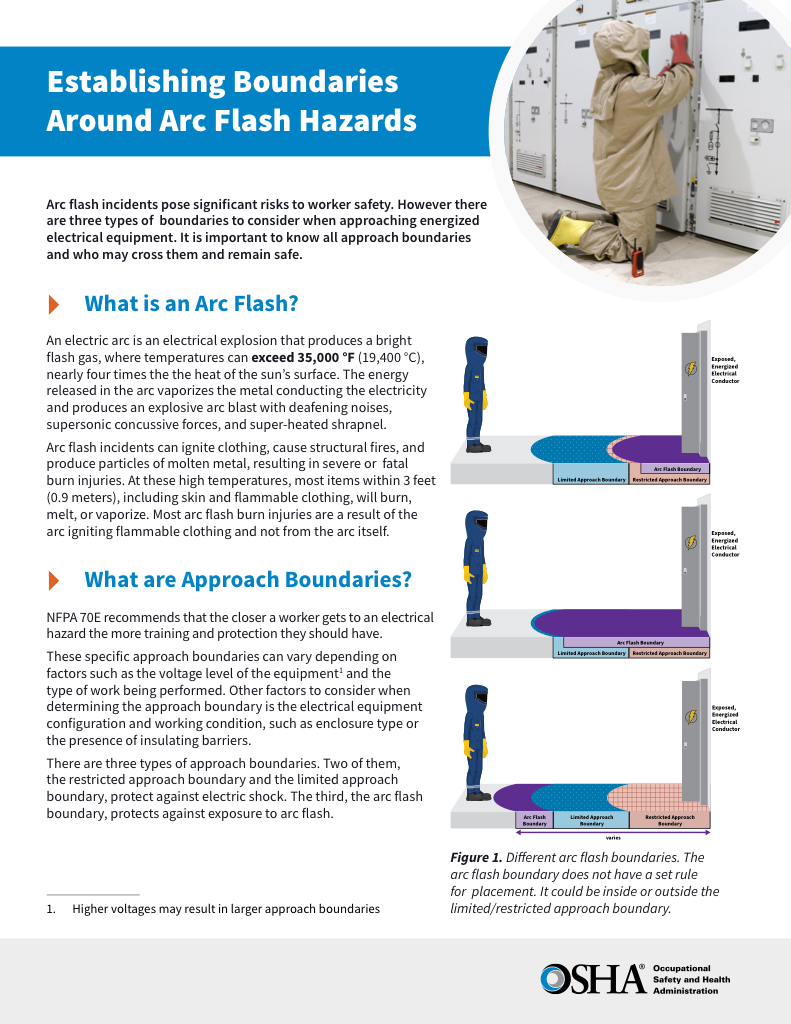Arc Fault Interrupter Breaker
By R.W. Hurst, Editor
Protective Relay Training - Basic
Our customized live online or in‑person group training can be delivered to your staff at your location.

- Live Online
- 12 hours Instructor-led
- Group Training Available
Download Our OSHA 4474 Fact Sheet – Establishing Boundaries Around Arc Flash Hazards

- Understand the difference between arc flash and electric shock boundaries
- Learn who may cross each boundary and under what conditions
- Apply voltage-based rules for safer approach distances
An arc fault interrupter breaker is essential in modern electrical systems designed to prevent electrical fires caused by arcing faults. An arc fault is an unintentional arcing condition that can occur in electrical wiring, leading to overheating and potentially igniting surrounding materials, causing fires. It is crucial for homeowners and electrical professionals to understand the importance of AFCI breakers, their role in ensuring safety, and the code requirements surrounding their installation.
What is an Arc Fault?
An arc fault occurs when the insulating material is broken around electrical wires, causing electricity to jump from one conductor to another. This creates a high-intensity discharge of electricity known as an arc. Arc faults can result from damaged wires, loose connections, or degraded insulation. These arcing conditions are dangerous because they produce intense heat, igniting surrounding materials and leading to electrical fires. A fault circuit interrupter afci is different from a standard circuit breaker. It is intended to de energize the circuit when an arc fault is detected
How Can I Protect Against Arc Faults?
Protection against arc faults involves using specialized equipment such as AFCI circuit breakers and fault circuit interrupters. An arc fault circuit interrupter is designed to detect the unique electrical signatures of arcing faults and de-energize the circuit to prevent fires. Installing breakers AFCI in your home's electrical panel is a proactive measure to enhance safety.
Does the National Electrical Code (NEC) Require AFCI Protection?
Yes, the National Electrical Code (NEC) mandates the use of AFCI protection in many residential settings. According to the NEC, AFCI protection is required in various rooms including family rooms, dining rooms, living rooms, parlors, libraries, dens, and bedrooms. These areas are prone to the use of portable electronic devices, which can increase the risk of arc faults.
Electricity Today T&D Magazine Subscribe for FREE

- Timely insights from industry experts
- Practical solutions T&D engineers
- Free access to every issue
Do CAFCI Circuit Breakers Provide a Higher Level of Protection Than an AFCI Receptacle?
Combination arc fault circuit interrupter (CAFCI) circuit breakers offer a higher level of protection compared to AFCI receptacles. CAFCI breakers provide continuous protection for the entire branch circuit from the electrical panel to the outlets, whereas AFCI receptacles only protect downstream from the receptacle itself. Therefore, CAFCI circuit breakers are considered more comprehensive in detecting and mitigating arc faults.
Which Will Cost Me More to Use — a CAFCI Circuit Breaker or an AFCI Receptacle? Which is Easier to Use?
CAFCI circuit breakers are generally more expensive than AFCI receptacles, but they offer broader protection. In terms of ease of use, AFCI receptacles are simpler to install and replace, making them a convenient option for specific applications. However, investing in CAFCI breakers is a prudent choice for overall safety and compliance with electrical codes.
Prioritizing Protection: Bedrooms and Living Rooms
When prioritizing areas for AFCI protection, focus on bedrooms and living rooms. These spaces are frequently occupied and contain numerous electrical devices that can pose a risk if an arc fault occurs. Ensuring these areas have arc fault detection and protection is vital for safeguarding your home.
AFCI at the Breaker and GFCI at the Outlet
Combining AFCI protection at the breaker with ground fault circuit interrupter (GFCI) protection at the outlet is a recommended practice. GFCI protection is crucial for preventing ground faults, particularly in wet areas like kitchens and bathrooms. By using AFCI breakers and GFCI outlets, you achieve comprehensive protection against both arc faults and ground faults.
120V Circuits and AFCI Exemptions
Certain 120V circuits, such as those dedicated to furnaces, gas stoves, dishwashers, and refrigerators, may not require AFCI protection. These appliances are typically hardwired and less susceptible to the risks associated with plug-in devices. However, always refer to the latest NEC guidelines and consult with a licensed electrician to ensure compliance and safety.
240V Circuits: AFCI Considerations
For 240V circuits like well pumps, air conditioners, dryers, shop heaters, and welders, the need for AFCI protection varies. Generally, AFCI protection is not required for these circuits under current electrical codes. However, if your air conditioner is a minisplit system with a 6-20 plug, consult an electrician to determine the best approach for protection and compliance with code requirements.
Understanding the role of AFCI circuit breakers in preventing electrical fires is crucial for homeowners and professionals. By ensuring that your home's electrical system is equipped with arc fault circuit interrupters and following the NEC guidelines, you can significantly reduce the risk of electrical fires. Prioritize protection in high-risk areas, combine AFCI and GFCI protection for comprehensive safety, and always stay informed about the latest electrical codes and best practices.








